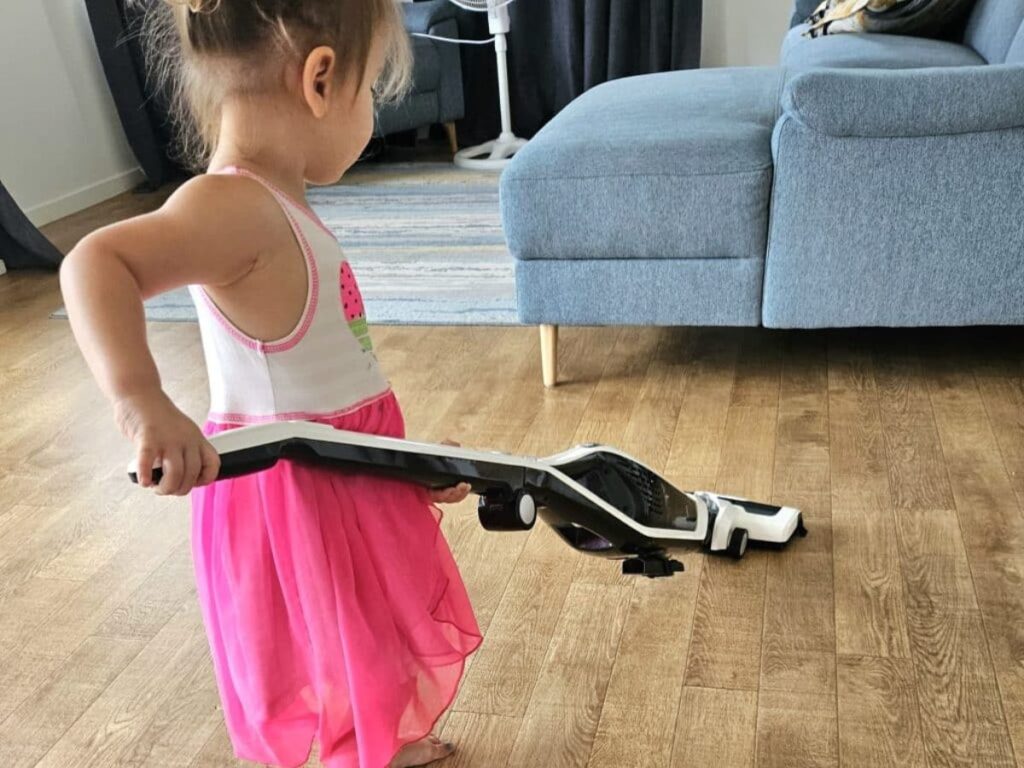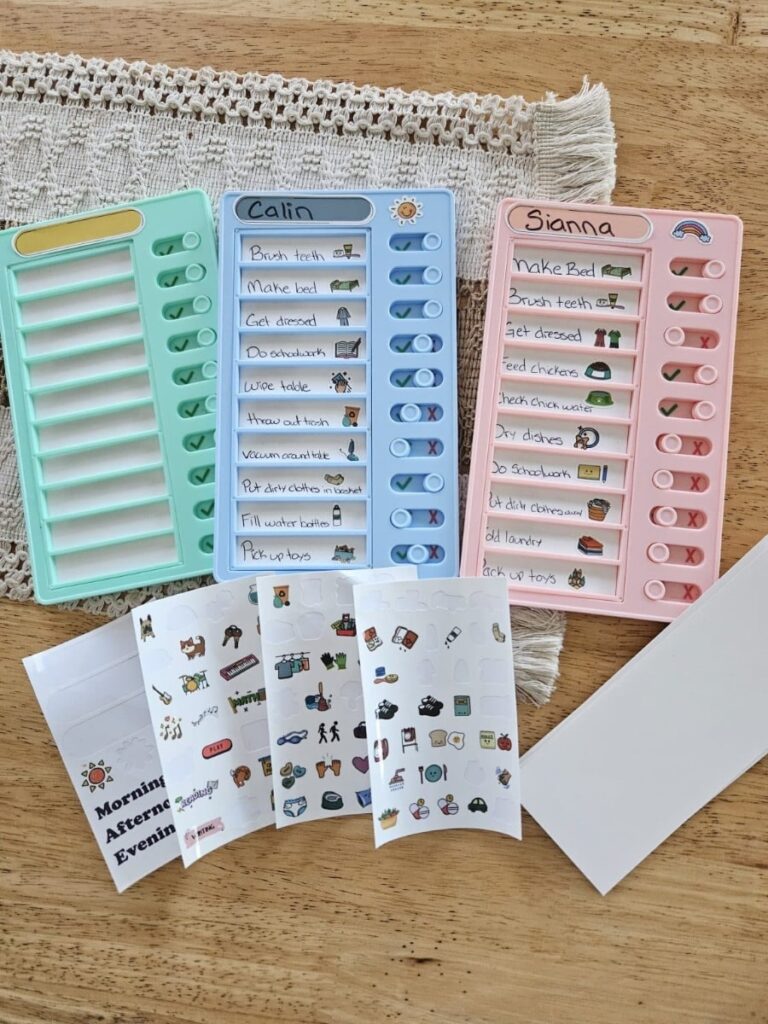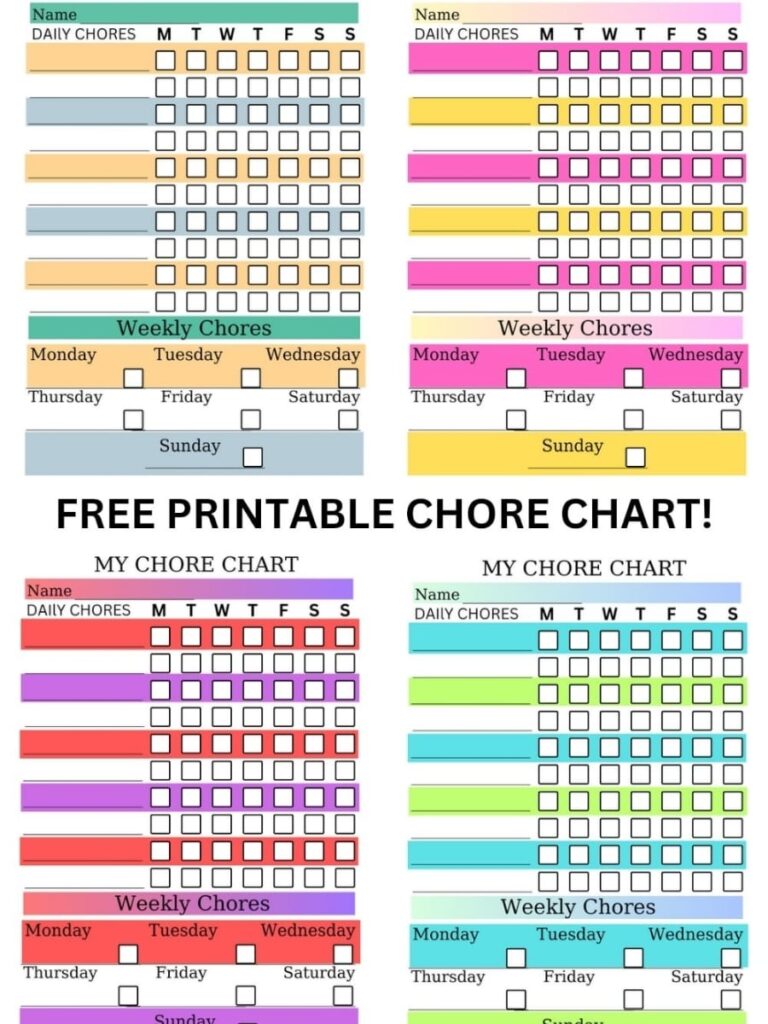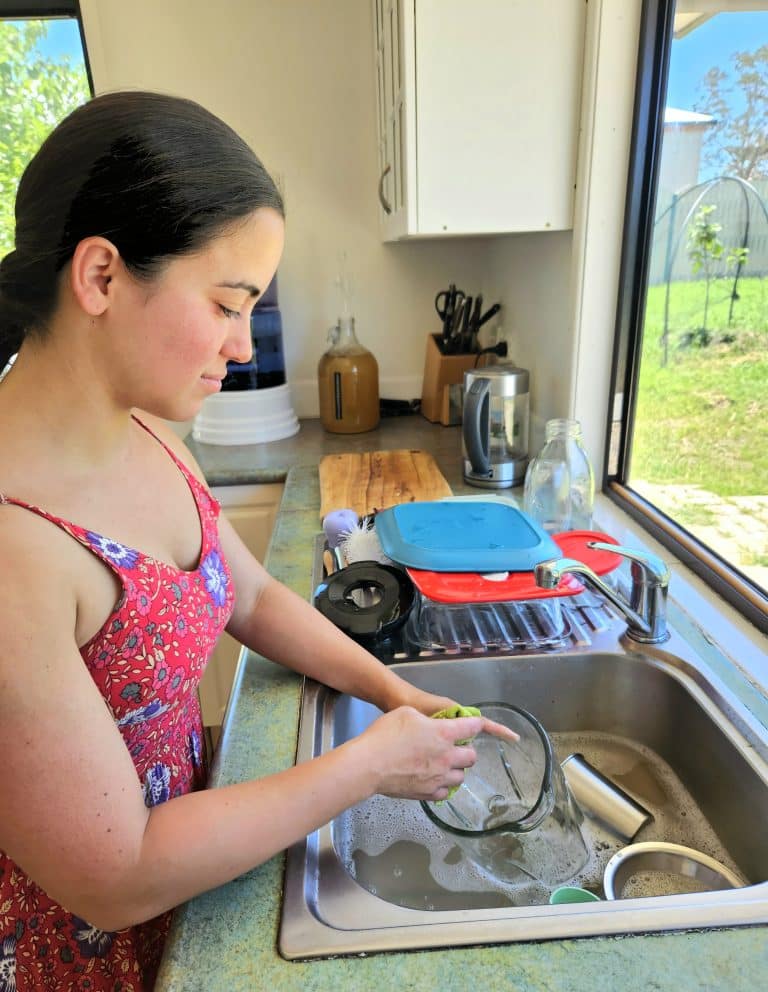Teach Life Skills To Kids By Doing Chores
Chores for kids can have a bad rap, but if you want your home to run smoothly certain tasks must get done regularly. A lot goes on in a house and a lot needs to be done if you want it running well.
There is a lot of debate whether children should do chores or not. There are a lot of reasons for parents to not require their children to do chores like they want to preserve their kid’s childhood.

They want them to have lots of playtime or feel their kids are so busy with school and then homework they won’t have enough time for fun if they do chores.
Some parents might just think it’s easier and quicker to do the task at hand themselves. Or they may not think their child is mature enough to handle doing chores.
While these are good points let’s consider the many benefits of why children should do chores! I also have a FREE PRINTABLE CHORE CHART IN 4 DIFFERENT COLOURS BELOW just for you!
What Are Chores?
What even is considered a chore? Well, a chore is something that is generally considered tedious and has to get done regularly. For example, washing the dishes, throwing out the trash and doing laundry would all be considered chores.
It’s something you have to do and is normally considered to be unpleasant. That doesn’t sound very good does it! The word chore isn’t a very intriguing word.
But if we change the sentence from, we have chores to do, to we have tasks to do, it can make it sound more appealing and less drudgery. At least that’s my personal opinion!
Why Children Should Do Chores?

Chores teach your kids important life skills.
- I don’t know about you, but I didn’t have a lot of chores growing up and I have to say when I left the house it came as a shock. I had to learn how to use an oven, how to do my own laundry, how to shop for food and clean! When kids take on the responsibility of doing housework, they are learning life skills that will prepare them for their adult lives.
Kids learn to take on responsibility.
- Sometimes it’s actually nice knowing you are trusted with certain tasks. Giving your kids certain responsibilities is saying “hey I believe you are capable of doing what I ask and doing it well”.
- They can take pride in doing a good job at the tasks they have been given.
Help teach them teamwork.
- A household has several people and all should be contributing to help it run smoothly. To keep things running well everyone must do their part.
- If they don’t do their part to help certain consequences can be given out. They can learn at home in a safe place that teamwork is dreamwork so let’s get the job done together.
Chores can build a strong work ethic.
- No one likes a lazy person! At home, school, sports, jobs strong work ethics are a thing to praise. It’s a trait that should be instilled from a young age that if you want something good you need to work for it.
- Paying kids for certain jobs as well can inspire their entrepreneur spirits.
Can help improve communication and listening skills.
- Let’s face it communication these days seems to be very difficult. When you ask your child to do something you need them to listen and often times repeat. If they have trouble, they come to ask you.
- These are good practices to start from a young age. Listening skills is something that has to be trained so next time you are talking to your child make sure they have stopped what they are doing and are looking at you. This way you know you have their full attention.
Help with time management.
- We live in a busy world where managing our time can be hard. Chores are a great way to learn how to fit in fun, studies and social time because they make you prioritise. This is key in the world and a great skill to learn while at home. They need to learn what is most important and get those things done first.
You can bond as a family.
- This can also be a great way to bond together as a family. Doing chores together can actually be a really great time to spend with your kids.
- Whether you are chatting while washing and drying dishes, seeing who can clean up the toys the fastest or just letting your younger one help separate the laundry piles, bonding is happening. It’s the little moments in the day that create lasting memories.
Cons Of Children Doing Chores
- Chores can be stressful for kids.
- If kids don’t understand what is required of them or have to many chores it can definitely be seen as stressful. Which is not something we want to do to our children. Make sure chores are age appropriate and they know what is expected of them.
- Chores can be seen as unfair.
- Depending on the chores kids can take it as unfair. Like we are passing our responsibilities onto them. By making sure the chores are age appropriate and chores get spread out evenly and/or rotated this shouldn’t be a big issue.
- They can cause arguments.
- Chores can definitely cause arguments if not done well or someone has an “easier” chore. Once again making sure they know what is required and age-appropriate tasks should solve this problem.
- Chores can be seen as a punishment.
- If kids only have to do chores when they misbehave this can definitely be seen as a punishment. Try to keep chores consistent.
How To Get Kids Involved In Chores?
This post contains affiliate links, which means I make a small commission at no extra cost to you. See my full disclosure, Policy.

Create a chore routine for your kids.
- Kids need structure and want to know what to expect. Make sure your kids know what is expected of them and be consistent with it. Once it becomes a habit it is just second nature and won’t even seem like a chore!
You can use a reward system to encourage kids to do chores.
- If they do their chores everyday maybe they get to watch a little tv, you play their favourite game with them, or they can stay up a little later. Doesn’t have to be money, you know what your kids like best!
Use an allowance to get children to do harder more tedious chores.
- There are certain tasks that are harder and don’t have to be done every day. Things like washing mom and dad’s car, cleaning the bathroom, or even babysitting the younger siblings for a while so you can do some of the bigger chores can have certain rates.
- When kids want some extra money, you can give them a list of different chores you deem worthy of pay under the circumstances that they are done well of course. I don’t think normal daily chores like making your bread or wiping the tables after meals are deemed worthy of pay but that can be up to you!
Set a time limit for chores.
- A time limit can be seen as a game or panic. Give a fair time limit and let them know if they finish before the time is up, they are free to do what they like. But if they don’t there is a consequence and make sure you stick to it!
Make sure you are giving your kids age appropriate chores.
- If you want your kids to do chores, make sure it’s something they are actually capable of doing. For example, my 5-year-old son cannot carry out the laundry basket and hang the clothes, he is too small, but he can put the clothes into the washing machine and turn it on. Asking your kids to do something that is beyond their capabilities is stressful and will lead to defiance and tears.
Praise your child whenever they do a good job!
- Who doesn’t enjoy being praised? It’s a great feeling when someone has taken the time to notice your hard work and efforts and you are more likely to do it again. It’s like an addiction once you get it you want it again and again. Praise your kids when they do something you like and do it well!
Should Kids Get Paid For Doing Chores?
People will have different opinions on this which is fine. I don’t think any opinion is really wrong, but I don’t personally agree with paying children for normal everyday chores.
In the real world no one is going to pay them when they make their bed or wash their own dishes. Being part of a family means they should contribute. This makes life easier on everyone in the long run.
Now there are certain chores you can have a list of that if kids want to earn some pocket money they can do. But these would be chores that are done more on a weekly or monthly basis.
Like cleaning the bathroom, washing the cars, maybe cleaning out the chicken coop if you have one, mowing the lawn.
Chores that require more effort and can really help you as the parent are worth being paid for in my opinion that is. You set your price and expectations and let them decide whether or not they want to do those tasks.
When Should Kids Start Doing Chores?
This can be another controversial topic, but I think kids should start doing chores from about the age of 2. Nothing to extreme of course make sure it’s age appropriate like picking up their toys and putting them away.
But honestly at this age they are generally ecstatic to help you! Getting them started at a young age is so much easier! First, it doesn’t seem like a chore at that age they just copy what you do, it’s fun for them helping mom and dad out and they love feeling helpful.
It’s great to get them into the habit of working and helping and won’t be such a struggle later on. My 2-year-old daughter has to be the best at picking up after her older sibling and putting everything back in its place!
Which also leads me make sure you have a spot for everything! If you need help with decluttering, I have this comprehensive blog post just for you to make decluttering less stressful and quick, with a free decluttering printable checklist as well!

Chores For Children By Age
Here is a guideline of some chores your kids can do depending on their age listed below!
Toddler Ages 2-3
- Pick up and put away their toys.
- Dust with a feather duster.
- Put dirty clothes in laundry basket.
- Put dirty clothes in the washing machine.
- Also stack books back on the shelf.
Preschooler (4-5)
- They can do the previous chores.
- Load the dishwasher.
- Hand dry dishes.
- Make their bed.
- Vacuum around the table.
- Clear the table.
- Wipe the dining table down.
- Also wipe up spills.
- Feed pets.
- Take out the recycling bin.
- Water garden beds.
- Can stir ingredients, crack eggs and chop soft vegetables with child safe knives.
Ages 6-8
- Kids can do previous chores.
- Sweep the floors.
- Also vacuum the floors.
- Fold and put away laundry.
- Clean the bathroom sink.
- Also throw out the garbage.
Ages 9-11
- Children can do previous chores.
- They can make simple meals.
- Wash and dry clothes.
- Hang clothes on the clothes line.
- Take rubbish out to the curb.
- Get the mail.
- Clean the bathroom.
- Also put groceries away.
Older children (12 and up)
- They can do previous chores
- Are able to make full meals and meal plan.
- Can start cleaning out the fridge and freezer.
- Mow the yard.
- Supervise young children.
- Lastly, they can iron clothes.
Let me know if you found this post helpful! I hope you enjoyed it and don’t forget to subscribe so you can get access to all my free current and upcoming eBooks and printables!







Yes!!!! From the moment my son was able to take his own toys out of a box, I began teaching him how to place them back in! My son is now 13 (only child) and is the only one responsible for emptying the dishwasher and placing everything in its place, maintaining, cleaning and decluttering his bedroom and his bathroom. He does his own laundry, folds and puts away his clothes. I have slowly introduced cooking in the past years and though I wouldnt allow him to do so unsupervised, yet, he has made simple meals for me i agree with you, if you teach them slowly and make it fun (not necessarily like a game but not to the point to make them dread it) then chores would not be stressful to them.